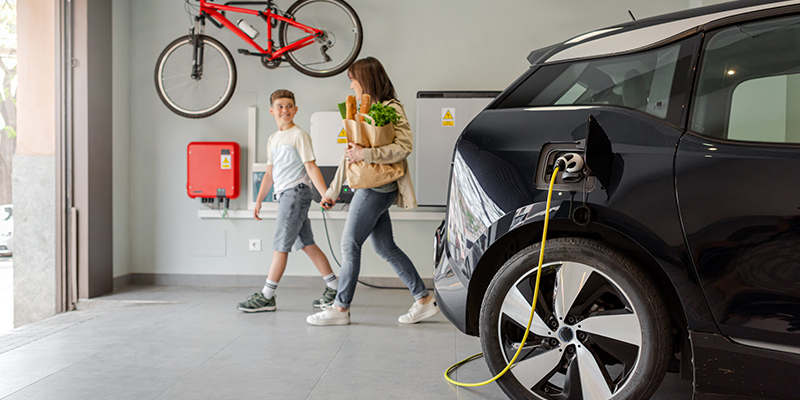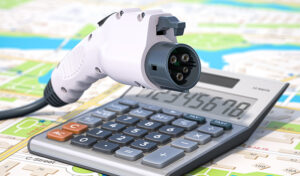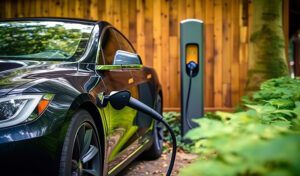Does Having EV Chargers Increase Property Value?

There is a common argument that EV chargers increase property value, but is there any truth to this claim? Homeowners and HOA communities alike have expressed concerns about the impact of EV charging stations on the value of a home. After all, nobody wants their investments to tank.
Browse By Category
Sign up for Our Newsletter
There is a common argument that EV chargers increase property value, but is there any truth to this claim? Homeowners and HOA communities alike have expressed concerns about the impact of EV charging stations on the value of a home. After all, nobody wants their investments to tank.
Do EV Chargers Increase Property Value?
Buying a home is a big step and is likely one of the most significant investments anyone can make. Thus, it makes sense for homeowners to want to protect their investments and even return a profit someday when they decide to sell. To do that, homes would need to increase in value. In the same vein, homeowners associations also aim to preserve property values.
However, increasing or even protecting property values does not come easy. You can’t do it without taking action. While it is true that time plays a significant role in raising property values, it can only do so much. If you don’t take the necessary steps to boost property value, it will likely remain the same or, worse yet, take a hit.
One of the best ways to increase value is to add upgrades to your home. In today’s world, a popular home upgrade takes the form of EV charging stations.
How Do Electric Vehicle Chargers Increase Home Value?
It is easy to claim that EV chargers directly correlate to enhanced property values. The claim does not hold much water without supporting arguments to back it up. So, how do EV chargers increase property value? Let us count the ways.
1. Convenience
First, EV charging stations offer convenience, particularly for electric vehicle owners. Owners can charge their car at home, eliminating the worry of running out of juice in the middle of a drive. Owners also don’t have to drive to the nearest charging station, which can be quite far in more rural areas, just to make sure they have enough to use the next day.
Additionally, having EV chargers at home means not waiting in long lines. Public charging stations tend to attract long queues, especially if only a few are around. And waiting in line can be a waste of time.
 2. Cost Savings
2. Cost Savings
Does an EV charger add value to your home? Yes, and one of the ways it does this is through cost savings for the owner. Having a charging station at home allows owners to leverage lower electricity rates during off-peak hours. Over time, this will translate to significant cost savings, as home electric rates tend to be cheaper than the rates of public chargers.
3. Environmental Impact
According to the U.S. Environmental Protection Agency, electric vehicles have a smaller carbon footprint than gasoline-powered ones. This is true even when you consider the electricity they use for charging. They are also better for the climate, reduce air pollution, and lower greenhouse gas emissions.
4. Attract Younger Homeowners
Installing an EV charging station in your home can attract potential buyers who are environmentally conscious. In the same way, HOA communities that invest in EV chargers can appeal to a new generation of buyers.
There is no denying that electric vehicles are growing in popularity with each passing year. The world is experiencing a shift to commit to more sustainable practices. By installing an EV charging station, you are giving your home or HOA a unique selling point.
5. Exhibit Commitment to Sustainability
There are plenty of ways to be more eco-friendly, but making a large investment in EV chargers sends a crucial message. It lets everyone know that you, as a homeowner or HOA, have long-term sustainability in mind. It also shows that you are not just all talk — you also walk the walk. Furthermore, installing EV charging stations will encourage neighbors and residents to follow suit.
How Much Can an EV Station Increase Property Value?
A study published in Nature Sustainability shows that homes near EV charging stations experience a boost in property value. According to the study, homes situated between 0.4 to 0.5 kilometers of EV chargers are valued at about 3.3% higher than homes outside of that range.
Based on this, it is clear that mere proximity alone can positively affect home value. Therefore, it is safe to assume that a home with an actual EV charger on the premises or within an HOA that has one will likely have a higher value as well. In comparison to the cost of installing an EV charger, which averages $2,000, the investment is worth it.
Understanding the Aesthetic Argument
 By now, it is apparent that installing an EV charging point can increase home value. However, some may claim that it can negatively impact the aesthetic appeal of a home.
By now, it is apparent that installing an EV charging point can increase home value. However, some may claim that it can negatively impact the aesthetic appeal of a home.
There are certainly people who deem EV chargers as conventionally ugly. With how far technology has advanced, many providers offer chargers with visually pleasing designs. Most chargers have a futuristic or minimalistic feel, which can go with plenty of architectural styles.
In the case of HOAs, it is normal to regulate the design of architectural upgrades or modifications. After all, HOAs are responsible for maintaining a uniform look and character in their respective communities. And while some states prohibit HOAs from banning EV chargers altogether, they are still allowed to impose reasonable rules, such as compliance with architectural standards.
A Future With Sustainability at the Forefront
When you examine all the evidence and arguments, it is clear that EV chargers increase property value. Homeowners and HOA communities just need to take the leap. Although not everyone drives an EV, the future is about sustainable living. As such, what may not appeal to all buyers now will likely appeal to them in a few years. The market will eventually adjust itself accordingly.
Homeowners associations should have an EV charging policy in place. An HOA management company can assist with this. Start looking for one in your area using our online directory!
RELATED ARTICLES:
- How Can The HOA Save On Water Costs?
- Xeriscaping In HOAs: Something The Board Should Think About
- Want To Switch To Artificial Grass? Here’s How To Do It
Trending Now
Related Article
Sign up for Our Monthly Newsletter
Sign up below for monthly updates on all HOA Resource















